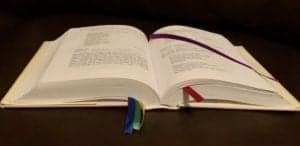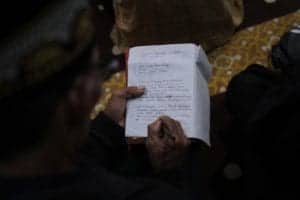Is There A Right Way To Pray?
 I used to believe there was one ‘right way’ to pray. Learning to pray as a young child by the bedside I look back with a twinge of horror, for the prayer I learned considered what I wanted if I died in the night.
I used to believe there was one ‘right way’ to pray. Learning to pray as a young child by the bedside I look back with a twinge of horror, for the prayer I learned considered what I wanted if I died in the night.
I didn’t understand death at that age and I wonder if it was wise to think about it before sleep every night.
The prayer often followed a lullaby that threatened to drop me from a treetop when the cradle I was in broke the bough it was swinging from. (Photo by Jude Beck on Unsplash)
It’s a wonder I ever became a person of prayer.
Later my experience was more ‘developed’ in that I learned to ask for things from a God who ‘supplied all my needs’. I assumed that included a ton of wants also.
‘Right Prayer’ is Authentic
 I spent a good part of my life in a tradition of liturgical prayer following words in a Book of Prayer written decades before and based on a tradition that went back centuries before my life began.
I spent a good part of my life in a tradition of liturgical prayer following words in a Book of Prayer written decades before and based on a tradition that went back centuries before my life began.
My experience of communication with the God of this tradition grows more and more distant with words that are not my words and a way of thinking that is not my understanding today about the nature of the Holy One, though for many people this is a rich and meaningful form of prayer. It is a good and right way to pray.
Although I do pray these prayers in community with others, they are not authentically mine.
That is, they don’t speak my heart.
There are some written prayers that have found a hook in my heart, though, lasting across time and carrying me through dark places.
 When I was young, I found a book that belonged to my father who served in WWII.
When I was young, I found a book that belonged to my father who served in WWII.
Primarily a book of poetry and prayer for servicemen, it beckoned me to its dusty pages at a very young age.
Two prayers from this book still live in my heart today. (Photo by Hannah Grace on Unsplash)
The first I never forgot because I could picture a farmer falling into his well and it reminds me that prayer doesn’t lose its efficacy because we are not using a particular body position – bowed head, prostrate, on one’s knees, etc).
This following discussion on ‘proper’ prayer includes one of the most authentic prayers I know.
Prayer of Cyrus Brown
By Sam Walter Foss (1858–1911)
“THE PROPER way for a man to pray,”
Said Deacon Lemuel Keyes, “And the only proper attitude,
Is down upon his knees.”
“No, I should say the way to pray,”
Said Reverend Doctor Wise,
“Is standing straight, with outstretched arms, And rapt and upturned eyes.”
 “Oh no; no, no,” said Elder Slow, “Such posture is too proud:A man should pray with eyes fast closedAnd head contritely bowed.”
“Oh no; no, no,” said Elder Slow, “Such posture is too proud:A man should pray with eyes fast closedAnd head contritely bowed.”
“It seems to me his hands should be Austerely clasped in front, With both thumbs pointing toward the ground,”
Said Reverend Doctor Blunt.
“Las’ year I fell in Hodgkin’s well Head first,” said Cyrus Brown, “With both my heels a-stickin’ up, My head a-p’inting down;
“An’ I made a prayer right then an’ there— Best prayer I ever said, The prayingest prayer I ever prayed, A-standing on my head.” Photo by Chase Moyer (detail) on Unsplash
‘Right Prayer’ Has Results
but Not Always What We Expect
The second prayer came from the same book and I turn to this in times of unanswered prayer. It sustains an attitude of gratitude for all things.
This prayer was ostensibly found in the shirt pocket of a soldier whose body was removed from the battlefield during the Civil War. This man’s ‘right way’ to pray was to write his prayer and carry it close to his heart.
“Prayer of an Unknown Civil War Soldier”
 (Photo by Gallery DS on Unsplash)
(Photo by Gallery DS on Unsplash)
I asked for strength that I might achieve;
I was made weak that I might learn humbly to obey.
I asked for health that I might do greater things;
I was given infirmity that I might do better things.
I asked for riches that I might be happy;
I was given poverty that I might be wise.
I asked for power that I might have the praise of men;
I was given weakness that I might feel the need of God.
I asked for all things that I might enjoy life;
I was given life that I might enjoy all things.
I got nothing that I asked for
but everything that I had hoped for.
Almost despite myself my unspoken prayers were answered,
I am, among all men, most richly blessed.
‘Right Prayer’ Can be Succinct
Ann Lamott put the ‘right way to pray in the title of her book, “Help, Thanks, Wow!” With her inimitable sense of humor Lamott boils the essence of prayer down into three little words. The efficacy of prayer is not in the prose we use, nor is it in the traditions and words of ancestors who spoke for their time and needs. The essence of prayer is not from our minds which store billions of neural connections that come together to form language. Prayer is an unspeakable process arising from the heart and merges in a universe way beyond our understanding.

(Photo by Khalil Yamoun on Sunsplash)
Prayer carries our deepest needs and concerns.
“Help!”
Prayer expresses our gratitude.
“Thanks”
Prayer acknowledges something bigger than language can describe.
“Wow!”
‘Right Prayer’ Can Be Silent
When words, music, ritual, or action fail to bring us into the Presence of Mystery could it be that we are not using the right language at all? Even succinct language? There is one practice of prayer that doesn’t come easily to most people. The Poet, Rumi, sums it up in two short phrases:
“silence is the language of God,
all else is poor translation.”
—-RUMI
 I think one of the reasons why we find the practice of silence as prayer difficult is that in silence the noise within our souls gets loud and raucous. All the inner voices that we keep subdued with music and ritual and prayerbook readings suddenly have no competition and step up to get our attention. (photo by Amy Tran on Unsplash)
I think one of the reasons why we find the practice of silence as prayer difficult is that in silence the noise within our souls gets loud and raucous. All the inner voices that we keep subdued with music and ritual and prayerbook readings suddenly have no competition and step up to get our attention. (photo by Amy Tran on Unsplash)
The voice of a saboteur who says there’s too much to be doing to be sitting here doing ‘nothing’.
The voice of a critic who says we ‘should’ be praying differently. The voice of a jester who tries to convince us that silence is folly.
There is a whole noisy committee on duty to stall our spiritual growth if we listen to it.

Although I am grateful for all the forms of prayer which have fed my soul and sustained my spiritual journey for decades I am most hungry for the prayer of silence—— the language of the Unheard, The Unseen, The Unknown. It is to Silence that I open my ears and my heart. I surrender my language ridden brain to what many call God and I choose to call Mystery. (Photo by Nine Kopfer on Unsplash)
It is in Silence that I become aware of my breath – Ruah – Spirit. Breath prayer is my favorite because it is the way I learned to “pray always”. Silence is ‘the right way to pray’ as far as I am concerned.
If you have a favorite way to pray please share in the comments below.


Judith Scarborough
Thank you for this reflection. I have begun yet another attempt to practice praying in silence. I believe there are many blessings in silence and would love to receive and share them.
Ardis Mayo
You’re welcome, Judith. I understand “another attempt”. My mantra is “Always we begin again”, wisdom from the desert mothers and fathers.
helen Willey
“Silence is golden”, said some wise man/woman. Continuous prayer struck a cord with me in one of Rev Richard Arnold’s sermons. On my knees, bowed head, folded hands, closed eyes was the first Sunday school lesson.
Ardis Mayo
Those early lessons certainly stick, don’t they? Thank you for sharing, Helen.
helen Willey
Thanks for helping me quiet my mind with -prayer advice. Helen
Ardis Mayo
Helen, I am so glad my rambling reflections are bringing you peace!
Pingback:
Pingback: